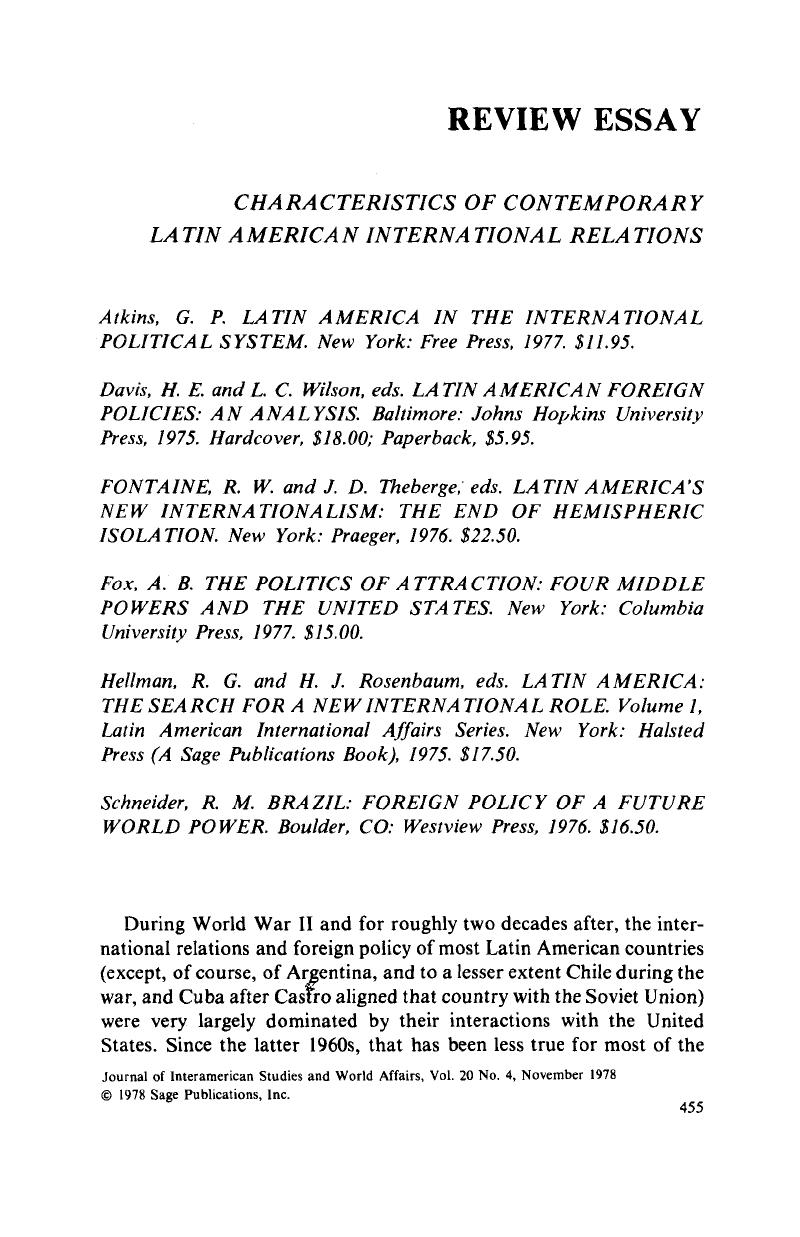No CrossRef data available.
Article contents
Characteristics of Contemporary Latin American International Relations
Published online by Cambridge University Press: 02 January 2018
Abstract
An abstract is not available for this content so a preview has been provided. Please use the Get access link above for information on how to access this content.

- Type
- Review Essays
- Information
- Journal of Interamerican Studies and World Affairs , Volume 20 , Issue 4 , November 1978 , pp. 455 - 467
- Copyright
- Copyright © University of Miami 1978
References
Avery, W. P. (1976) “Oil, politics, and economics policy making: Venezuelan and Andean Common Market.” International Organization
30 (Autumn): 541–571.Google Scholar
Barros, A.S.C. (1975) “The diplomacy of a national security: South American international relations in a defrosting world,” p. 142 in Hellman, R. G. and Rosenbaum, H. J. (eds.) Latin America: The Search for a New International Role.
New York: Halsted Press (A Sage Publications Book).Google Scholar
Brown, E. D. (1975) “Latin America and the international law of the sea,” pp. 247–270 in Hellman, R. G. and Rosenbaum, H. J. (eds.) Latin America: The Search for a New International Role.
New York: Halsted Press (A Sage Publications Book).Google Scholar
Fortín, C. (1975) “Principled pragmatism in the face of external pressure: the foreign policy of the Allende government,” pp. 217–245 in Hellman, R. G. and Rosenbaum, H. J. (eds.) Latin America: The Search for a New International Role.
New York: Halsted Press (A Sage Publications Book).Google Scholar
Krause, L. B. (1976) “Latin American economic relations with Western Europe,” pp. 143–156 in Fontaine, R. W. and Theberge, J. D. (eds.) Latin America's New Internationalism: The End of Hemispheric Isolation.
New York: Praeger.Google Scholar
Milenky, E. (1975) “Problems, perspectives, and modes of analysis. Understanding Latin American approaches to world affairs,” in Hellman, R. G. and Rosenbaum, H. J. (eds.) Latin America: The Search for a New International Role.
New York Halsted Press (A Sage Publications Book).Google Scholar
Moran, T. H. (1974) Multinational Corporations and the Politics of Dependence
Princeton: Princeton Univ. Press.Google Scholar
Ronfeldt, D. F. and Einaudi, L. R. (1974) “Conflict and cooperation among Latir American states,” pp. 185–200 in Einaudi, L. R. (ed.) Beyond Cuba: Latin Americ; Takes Charge of Its Future. New York: Crane, Russak.Google Scholar
Schmitter, P. C. and Haas, E. B. (1964) Mexico and Latin American Economic Integration.
Berkeley: Institute of International Studies, University of California.Google Scholar
Speigel, S. L. (1972) Dominance and Diversity: The International Hierarchy. Boston Little, Brown.Google Scholar
Swansbrough, R. H. (1976) The Embattled Colossus: Economic Nationalismam the United States Investors in Latin America.
Gainesville: Univ. of Florida Press.Google Scholar
Swansbrough, R. H. (1975) “Peru's diplomatic offensive: solidarity for Latin American independence,” pp. 115–130 in Hellman, R. G. and Rosenbaum, H. J. (eds.) Latin America: The Search for a New International Role.
New York: Halsted Press (A Sage Publications Book).Google Scholar




